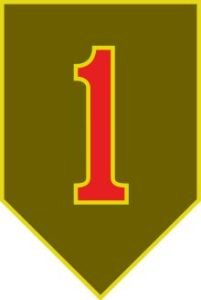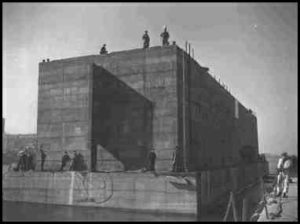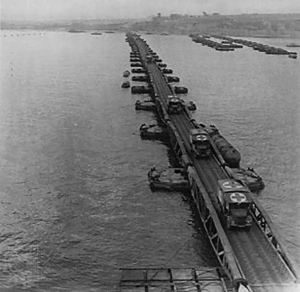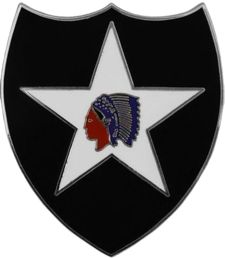Return To D-Day: Sergeant Major Robert “Booby” Blatnik

For the past 23 years, veterans age 55 and older have come together to compete in the National Veterans Golden Age Games  . It’s the largest sports and recreational competition for this age group of military veterans in the world, and this year’s competition, held in Birmingham, Ala., in early June, marked a special commemoration.
. It’s the largest sports and recreational competition for this age group of military veterans in the world, and this year’s competition, held in Birmingham, Ala., in early June, marked a special commemoration.
On June 5, 2009, the eve of the 65th anniversary of D-day  , four veterans of World War II who fought in Normandy, on and after that frightful day, shared their stories.
, four veterans of World War II who fought in Normandy, on and after that frightful day, shared their stories.
Robert Blatnik , an 89-year-old Army veteran, was on the eastern half of Omaha Beach during the invasion. Amazingly, he lived to tell about it.
“On the beach, the artillery and smoke were everywhere,” said Blatnik. “It was chaos all around us. I didn’t even see any small arms fire from the Germans, just bodies and bombs going off everywhere.” A sergeant major at the time of the assault on Normandy, Blatnik was already a battle-hardened soldier serving under General. George Smith Patton,  in the infamous 1st Infantry Division
in the infamous 1st Infantry Division  , nicknamed “Big Red One.” Before D-Day, Blatnik fought in the Tunisian campaign in North Africa, and was a part of the invasion of Sicily, in 1943. The casualties from the 1st Division in Europe, total battle casualties: 20.659, killed in action: 3.616, wounded in action: 15,208, missing in action: 499 and prisoner of war: 1.336.
, nicknamed “Big Red One.” Before D-Day, Blatnik fought in the Tunisian campaign in North Africa, and was a part of the invasion of Sicily, in 1943. The casualties from the 1st Division in Europe, total battle casualties: 20.659, killed in action: 3.616, wounded in action: 15,208, missing in action: 499 and prisoner of war: 1.336.
Blatnik said his experience helped keep him alive. “I knew that the main thing to do was to get off the beach. Some of the men wanted to dig in. When you’re on a beach the main thing to do is confront the enemy.

 you can’t dig in during something like that; you’ve go to get the hell off the beach. If you try to dig in you’re lost, so I tried to keep my men moving forward.”
you can’t dig in during something like that; you’ve go to get the hell off the beach. If you try to dig in you’re lost, so I tried to keep my men moving forward.”
Bob Sherwood, a 90-year-old veteran of the Merchant Marines  also played a crucial role in the invasion of Normandy. “On June 6, 1944, at about four o’clock in the morning, I was on an ocean-going tugboat, hooked up to a big concrete block,” said Sherwood. “We got to Normandy before the invasion and dropped the block.”
also played a crucial role in the invasion of Normandy. “On June 6, 1944, at about four o’clock in the morning, I was on an ocean-going tugboat, hooked up to a big concrete block,” said Sherwood. “We got to Normandy before the invasion and dropped the block.” 
The blocks Sherwood speaks of were ferried across the English Channel to establish man-made harbors, so that troops and supplies could get in. The Merchant Marines played a major role in the war by supplying more than 70 percent of the troops’ supplies. Sherwood joked that without the Merchant Marines we wouldn’t have won the war. 
“We had more than 200 concrete blocks to form a breakwater,” said Sherwood. “They moved us away from the invasion and here comes these poor kids. I thanked God I was on a tugboat. These kids hitting the beach, they’re the ones who took the beating. They’re the ones I take my hat off to.”
After D-Day, it was up to Soldiers like William Trumbly,  an 87-year-old Army veteran, to help make the way into France. It was June 16, 1944, just 10 days after D-Day, when Trumbly, a replacement officer in the 2nd Infantry Division
an 87-year-old Army veteran, to help make the way into France. It was June 16, 1944, just 10 days after D-Day, when Trumbly, a replacement officer in the 2nd Infantry Division  under command of General Walter Melville Robertson
under command of General Walter Melville Robertson  , led a platoon into combat in Normandy. His objective was to secure Hill 192, so the Allied forces could advance past German lines deeper into France. Casualties of the 2nd Division, total battle casualties: 16.795, killed in action: 3.031, wounded in action: 12.785, missing in action: 193 and prisoner of war: 786.
, led a platoon into combat in Normandy. His objective was to secure Hill 192, so the Allied forces could advance past German lines deeper into France. Casualties of the 2nd Division, total battle casualties: 16.795, killed in action: 3.031, wounded in action: 12.785, missing in action: 193 and prisoner of war: 786.
Trumbly, a mortar officer, was 500 feet back from the men on the front lines, but close enough to witness many of them lose their lives. After they secured the hill, Trumbly experienced something he will never forget. “I saw a German soldier laid out like he should be in a casket, so I immediately thought something was wrong. He was laying there with his hands on his chest, so I got down and saw that he had a grenade under his hands.”
His attention to detail that day saved his life, and the lives of the men around him. It was after that when Trumbly reflected on his mortality.
“A couple days after that, I said Lord, I’d like to live, but if I get killed that’s all right. I don’t think I’ll survive too many battles like this by myself,” Trumbly said. “I got wounded twice after that, but here I am, 87 years old sitting in front of you.” When these veterans reflect on their time in the war, the fact that they made it through is not lost on them.
“I thank God that I made it, I thank him all the time,” said Blatnik. “Faith helped get me through three invasions. I wonder, why me, when so many others died'”
Lessons learned The lesson Robert Sherwood learned from war sticks with him to this day. “My advice is to live every day because you may not make it to see tomorrow. Thank God that you’re here, because who knows if you’re gonna be. Live every day for today.” “Freedom somebody has to pay for. Freedom is not free, but it’s worth fighting for. I’d rather die fighting for freedom than kneel before a dictator for help.”
When Blatnik returned from the war, he felt like he was saved for a reason and has since worked to justify that existence. After retiring from the U.S. Postal Service, Blatnik became a paramedic and volunteered his time helping others.
“Helping other people was the best pay I’ve ever received,” said Blatnik. Even at the age of 86, Blatnik still donates his time to the Department of Veterans Affairs Medical Center in Dallas, visiting patients who just need someone to talk to. Sherwood came home and worked delivering bread to people’s homes. He recounts the time fondly, and said, “I sure loved delivering bread to those women every day.” 
When Trumbly came home, he decided to go back to college. Earning a degree in geology, he worked in that field until he retired. Now, 65 years after the invasion in Normandy, the physical and emotional wounds of war continue to be healed at the National Veterans Golden Age Games. Veterans from all walks of life come together to compete, bond and cheer each other on. It’s those friendships that serve as a special type of therapy-one that helps these veterans lead fuller, more active lives.
“It’s not about winning the medals,” said Trumbly. “It’s about camaraderie, having fun and helping us for our mental and physical health. It’s done me a lot of good to be at the games.
 Blatnik here on the German cemetry in Normandy, La Cambe.
Blatnik here on the German cemetry in Normandy, La Cambe.











Leave a Reply